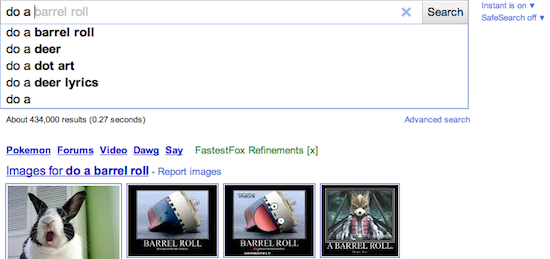Google Instant Inconsistently Censors Itself
The first questions we heard when explaining Google Instant to people was “what if the search I want to make starts out as a search for something, uh, explicit?” The answer is that Google Instant selectively doesn’t function for certain search terms. For example, if you’re just trying to Google your new coworker Jenna James, typing Jenna will get you an array of pictures of Jenna Fischer, but once you put in the first J of that last name, Google Instant will assume you’re looking for former porn star Jenna Jameson and clam up, yielding no results until you press enter.
So that’s all well and good until you, like Queerty, do some more legitimate and less specific searches that just so happen to sometimes overlap with porn, and you find out that Google Instant also censors the results for “lesbian,” “bisexual,” and “orgasm.”
From Queerty:
Google Instant has a weird and inconsistent approach to handling other queer terms. For example, they’ll serve up results on lesbian rights, lesbian film, and lesbian art, but only if you type in those words after entering lesbian — otherwise you get a blank page. They’re also OK with “fag” which yields fag jokes, fag bomb, and fag bash but not with “faggot.” And you’ll only get a blank page for “hate crime” even though they serve up links for “gay bash.”
“Hate crime” at least makes sense when you consider that Google has always had a policy of not serving suggested results for searches such as “i hate.” In fact, the point at which Google Instant stops suggesting search terms for “hate crime” is actually as soon as you press the spacebar. “Hate_” And Google Instant does show the results for “anti-gay, closeted, crotch, DADT, drag queen, ENDA, erection, ex-gay, leather daddy, [and] oral sex.”
Queerty hypothesizes that many of these terms are censored because the dominant search results for them are porn related. But the results of searching for “lesbian” actually gives you a page full of positive LGBT resources (and one dubious but non-pornographic supercut of all the times in Xena: Warrior Princess when Xena and Gabriel touch each other). “Bisexual” is the same, and even “orgasm” and “lesbians” have 6 out of 10 links directing to serious resources rather than pornography. The results for “faggot” are mostly various dictionaries including the British English (a cigarette) and the antiquated (a bundle of sticks) use of the term .
Of course, search results can change over time, even minute to minute, but the real issue here is the inconsistency. The colloquial “fag” is okay, but the less slangy “faggot” must be censored? “Gay” is fine, but “lesbian” and “bisexual” aren’t, even though their actual pornographic content is the same? We’d prefer if no terms were censored, but if you’re going to do some there should be a little more rhyme to the reason.
But does this really matter, when all you have to do to get results is press enter? Queerty says:
One of the joys of searching is accidentally stumbling upon new links and associations you didn’t originally think of — like going into Wikipedia to learn about Alice in Wonderland and ending up reading about psychopharmacology. Often, you don’t often know what you’re interested in until you see it.
By narrowly restricting their search results to avoid poon, Google Instant has perhaps deprived young lesbians who could benefit from learning about lesbian art or lesbian rights if they only knew to keep typing. Google Instant would do better to combine their current SafeSearch filters with Google Instant to offer more robust search results that challenge and educate their users rather than censor them before they’re finished typing.
Seems reasonable to us. Google Instant, as the default Google search method, is now just Google. And Google should not be censoring its results.
(Queerty via Bitch Blogs.)
Have a tip we should know? tips@themarysue.com
